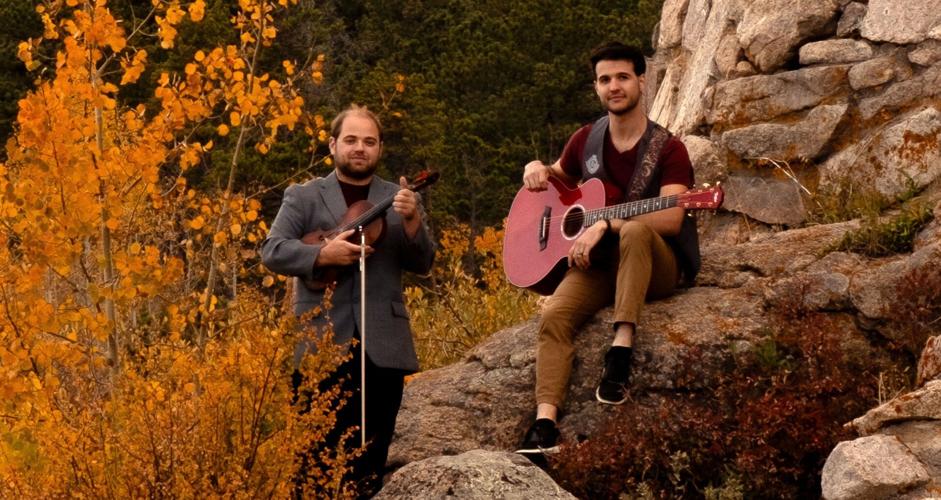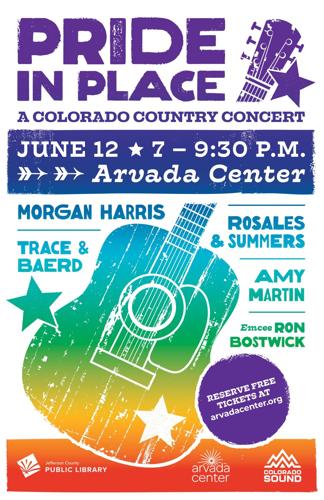Pride in Place: Arvada holds its first Americana Pride Month concert
Situated smack dab in the middle of Pride Month is a twangy concert reverberating the importance of counterculture throughout art.
The Jefferson County Library and the Arvada Center will be holding its first “Pride in Place” concert on Thursday at the Arvada Center’s Mainstage Theater, highlighting local country, Americana and bluegrass artists that identify within the LGBTQ+ culture.
“Bluegrass, country and Americana music is for everybody, regardless of age, race, gender, orientation, nationality, upbringing, or politics,” The Arvada Center said on its website. “Celebrate the rich tradition of Colorado bluegrass music with this special Pride concert.”
The concert will include four artists: Amy Martin, Trace & Baerd, Rosales and Summers and Morgan Harris Guitar.
But under the event lies the question about the shifting of openly inclusive art — especially within a genre often seen as exclusive to straight men with John Wayne posters plastered on their walls.
“I was certainly surprised,” Philip Sneed, CEO of the Arvada Center, said of when the library reached out to him with the idea. “I, to my ignorance, did not know this existed, but I was immediately delighted to hear it.”
Overall, the stereotype of country music being exclusive isn’t as steeped in tradition as some may believe.
The Sweet Violet Boys — also known as the Prairie Ramblers — released a country track in 1939 titled “I Love My Fruit.”
While the four members of the Sweet Violet Boys never openly identified as queer, the song’s lyrics brought about controversy amongst the genre’s fanbase.
The chorus, steeped in crunchy country group singing prominent in the era, says: “I like to eat. And no matter what it is, I like to eat.”
Wilma Burgess, a country singer in the 1960s, was never openly gay, but her sexuality was often questioned due to gender ambiguity in her lyrics.
She eventually left the music industry and opened Nashville’s first lesbian bar, The Hitching Post, in the 1980s.
The first openly gay country musician came in 1973 with Lavender Country’s debut, self-titled album. The singer, Patrick Haggerty, came out in 1969 and was a gay rights activist in Seattle.
“Just to say in 1973 that you were ‘gay country’ was so completely outrageous in terms of its sale-ability to the general music market,” Haggerty told Willamette Week in 2019. “So we knew we were on our own. We had a few ‘customers,’ and they were other Stonewall rebellion, gay liberationists. Other than that, it was like no hope.”
The album only sold around 1,000 copies, but saw a revival in the late 2010s due to its cultural significance.
Nowadays, as cultural views on sexuality have lightened, there has been an influx of openly gay country and western musicians.
Orville Peck, for example, packed the Fillmore Auditorium in August.
Brandi Carlile, an openly queer woman, has won 11 Grammys since 2005.
“It has been a lot more prominent in the last five-to-ten years,” Trace Hybertson, one half of Trace & Baerd, said of LGBTQ+ artists in the sphere. “Now you see people with rainbow flags at bluegrass festivals. There are a lot more people who are open about who they are and who they want to be.”
Trace & Baerd — a two-piece “Americeltic” band playing at the Pride in Place concert — started around 2022, melding effortless-yet-intricate fiddle and guitar playing with Celtic sounds.
The instrumental music blends the rich sound of American folk music with the whimsy of northern Europe tradition, creating for a sound akin to riding through a fantasy world dressed in cowboy attire.
Hybertson is openly gay, and that hasn’t stopped him from seeing success in the already niche industry.
Despite starting just three years ago, the duo has seen radio play in 14 different countries, including Ireland and Spanish-speaking countries.
“Fiddle and guitar. It’s simple and it’s authentic,” Hybertson said.
To the two, the authenticity of their music is what transcends the cultural boundaries once strictly laid upon the genre.
“It’s become a lot more open and accepting, which goes with the folk music ethos,” Hybertson said. “It’s about authenticity and telling stories.”
“I like that Trace and I have the dynamic of different sexualities because you can look at it and go, ‘Look how great they play together. Look what they can do together,'” Adam Baerd said.
Folk music and bluegrass, too, have a long history with appealing to countercultures, despite a stereotype against it.
Female artists Ronnie Gilbert and Joan Baez, for example, both made suggestive songs in the 1950s and 60s implying being gay, but never openly identified as lesbian.
Now, the sphere has opened.
Hybertson pointed toward the nonprofit Bluegrass Pride, where he found the post about the Arvada concert.
The nonprofit works to put on shows and instill inclusivity in the genre.
“We want current bluegrassers to know that they are loved and treasured for who they are and the music they make. We want future bluegrassers to know that they are welcome to come as they are without fear of retribution or exclusion,” the organization wrote on its website.
Hybertson also pointed at Colorado as being progressive when it comes to acceptance in the music scene, though he thinks it’s a nationwide shift overall.
“Years ago, yes,” he said about feeling prejudiced against in the scene. “I grew up going to bluegrass festivals, primarily in Colorado. Ten years ago, I wouldn’t have wanted to be out. Now, I don’t care.”
He continued: “There are certain places in the country where I would not necessarily hide who I am, but certainly tack less of that on my identity.”
Arvada is not one of those places.
Arvada Center’s Sneed said both the city government and its residents have been supportive of the Arvada Center and Jefferson County Library’s Pride-based events over the years.
“I don’t want to have blinders on because I know I spend much more of my time with people who share my values, but I tend to be surprised by our volunteers who tend to be elderly and white, how many of them have responded as well,” he said.
To Sneed, coming out to events like the Pride in Place concert are important to see “a fuller picture of LGBTQ+ community life. It’s not just the stereotype of what some people think that community is about. It includes all types of things any of us enjoy.”
“You can just be more sensitive and be nice, and that works for everybody,” Baerd said.
Hybertson concluded: “Music has the opportunity to be a great unifier, and it should be used as such. It’s the ultimate communication tool. Why not use it as that?”
The Pride in Place concert is free to the public. It will be held at the Main Stage Theater at 7 p.m. Thursday. Tickets can be reserved at the Arvada Center’s website.






